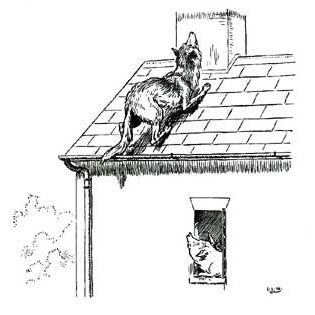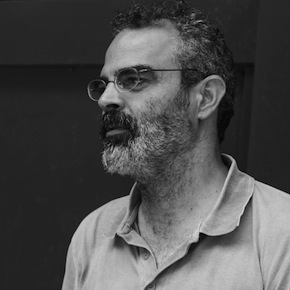Every animal has its own madness
by Gonçalo M. Tavares
Illustration from The Story of the Three Little Pigs by L. Leslie Brooke, Frederick Warne & Co., 1905. Wikimedia Commons
Plague diary, 25 March 2020.
Sometimes, in the terrible world, people open their front doors just slightly and spit as foreigners pass.
Foreign, I’m told, in one of the Slavic languages, means mute.
Whoever does not speak my language, is mute.
Whoever does not have my history, is mute.
“Virus detected in the sewers in Holland.”
“The sun is coming out, but the rain will fall again this Wednesday.”
There are boats moored waiting for authorization to unload their human cargo.
Nature must be looking in astonishment at humans.
Why are they withdrawing?
Two dogs.
Jeri, short for Jeriquaquara, Brazil.
Aged seven. And Roma, Belgian sheepdog.
Aged one.
My bitch Roma is restless.
Too much energy per square metre.
“The number of doctors who’ve died in Italy rises to 30.”
Leave it; something else now.
We’re monks, yes that’s it, except without the belief.
Isolating yourself out of fear or precaution is not like isolating yourself for faith.
Virilio talked about “destroying the environment with speed.”
Accioli in Italy, in the northern zone, is running on the spot at home so as not to go crazy.
Staying on the same spot, but quickly.
Destroying your own home with speed.
Destroying your family with speed.
Destroying your family with slowness.
I watch Bolt in a race.
The 100-metre record, 9.58 seconds.
“The sun is coming out, but the rain will fall again this Wednesday.”
I imagine people coming out of their houses and going to celebrate the world record with Bolt.
Staying out of the house for as little time as possible.
Do what’s essential and come right back.
Being a sprinter, but along the way doing things with their hands.
Buying food.
Driving the car.
The speed of the head and the speed of the hands.
Listening to the car radio and demanding an increase in the speed of the talking.
That on the radio they start speaking at the wrong RPM.
In Croatia an earthquake means people must go outside and a virus means people must stay home. People go outside, but keep a distance from one another. They’re all in a muddle: I go out, I stay in.”
I remember an LP.
A children’s story about the big bad wolf and the three little pigs. On a record.
It said the wolf was bad, very bad, totally bad.
But nobody is bad, very bad, totally bad.
“Catastrophe would be the simultaneous presence of all things,” said Sloterdijk in an old interview.
Catastrophe now as the absence of all things.
News from two days ago.
In Croatia an earthquake means people must go outside and a virus means people must stay home.
People go outside, but keep a distance from one another.
They’re all in a muddle: I go out, I stay in.
Roma wags her tail, she’s thirsty.
Jeri, peaceful, consumes energy and looks at things.
I pick up an angel, it’s twenty centimetres tall.
It’s made of some strange material.
It seems soft on the inside.
I go to fetch a kitchen knife.
I stop.
I leave the angel and the kitchen knife side by side.
See if the knife makes the angel angrier, see if the angel softens the knife.
I’m looking at them both as if they were two new friends.
But they are not.
738 dead in Spain.
In Italy, it’s 683.
Portugal, Spain, France, Italy, the United States, Brazil, Iran, South Korea, Holland, Belgium.
A country’s temperature is measured by the number of the dead.
A temperature that’s black, grotesque.
Son-of-a-bitch of a temperature.
Hearing a number as if you’re hearing an answer.
But nobody’s asking a question.
The burger joints in the United Kingdom are closing down.
I’m reading a book about the characteristics of animals.
Every animal has its own madness.
There is a lot of fear in homes.
It’s like a public threat made against the old.
What must they feel, those who are over seventy, who are over eighty?
Clothes need to be washed at 70 degrees at least.
The enemy must be burned.
There’s a line I like from a poem, but I’ve forgotten it.
Roma plays with Jeri, the two of them don’t notice anything.
My angel is open-mouthed.
But not by his own choice.
I was the one who opened his mouth by force.
But he’s amazed at all this.
Even those beings from up there don’t really understand what’s going on down here.
The angel has his mouth open.
—
2 April
Somebody says the peak will come on such-and-such a day.
The laws of physics and of the speed of materials are applied to biology.
The uniformly accelerating movement of evil.
But evil is not like goodness.
Goodness is predictable.
Evil is not predictable.
That’s for sure.
There’s talk of the peak of contamination as if it were the peak of a mountain.
In time the numbers are transformed into lines and lines are transformed into mountains.
High mountains, low mountains.
There’s talk of squashing flat the bad mountain, the plague mountain.
A living mountain, forming before our very eyes.
Each day contributing to the mountain’s final shape.
I imagine somebody scaling the plague mountain.
A fake mountain, which is not to be found in space like the others.
It is to be found in time.
A mountain that is swept away: by death, medicine or isolation.
Squash the mountain.
Really whack the head of the bad mountain until it becomes small and almost harmless or even lifeless.
Says Roberto, a young boy.
Transform the mountain into a carpet.
Put it on the sun, far away from humans.
‘There are already more than a million people infected around the world.’ There have always been stupid competitions. Running-races with eyes blindfolded.”
“We’re going to have a revolution in the prison – say a group of prisoners after learning that a guard was infected.”
“I’m well within the confines of my distress,” said a friend of a Brazilian friend “serenely”.
An Angolan friend recommends for home, patience and chasteberry oil.
A former President of the Republic says: “We, the old people, will be the first to set an example.”
He says: “If necessary, we will offer up our ventilator to the man who has a wife and children.”
The old teaching the younger to walk.
“There are already more than a million people infected around the world.”
There have always been stupid competitions.
Running-races with eyes blindfolded.
On 5 September 1952, in Loughton, Essex, England, for example.
Graham Henry Salmon ran a hundred metres in 11.4 seconds with a blindfold over his eyes.
Trying to run as fast as possible, but with a blindfold over your eyes.
Here we are. Speed and blindness.
At least make a hole in the cloth.
Seeing out of one eye, seeing a part, understanding a part.
Deaths in Spain, the United States, Italy: the shock becomes shocking; the shocking, habit.
At home, a huge appetite.
We are stomach and two eyes.
An old lady receives soup and food at home delivered by a generous man with a mask on his face and a yellow vest.
It looks like an accident. Everything has a yellow vest.
A general accident, but it is not located in any particular point in the city.
A massive collision but with no collision, with no metalwork, with no matter.
The traffic stopped, evaporated.
The cars have all been gathered away – like animals that have fled in terror from a cyclone to their cocoons.
The price of petrol drops, how kind of them.
The United States less than a week ago tested a hypersonic missile, faster than the speed of sound.
Sound is already too slow for the twenty-first century.
The speed of sound is slow in the plague days.
It is hard for sound to reach whoever can save you.
Try shouting if you need help.
In Brazil, in Belo Horizonte, BH, the military police who are sometimes scary, and not only to criminals, announce by loudspeaker that people should retire to their homes.
“Attention, citizens, this is the military police. Make your way to your homes.”
I think, suddenly, of vultures.
A piece of work by João Onofre films a vulture inside a room.
The vulture is disoriented because it wants to eat and there is no food.
Everything is hard, nothing is soft or food.
I receive a text.
“Get a P——e Health Plan and immediately use video-consultations without leaving the house. You can also take a Covid-19 test. Learn + in this link.”
The vulture has got its bearings back and it wants to eat.
The “air has pipes everywhere”
“and the murmurings of money are arriving,” Miguel Cardoso.
England: there is talk of fines for people who go out to buy hair dye.
I open a website.
It says right away: Relax with Mozart.
I wasn’t tense.
The vulture must be shut inside a room.
Only give it hard things to bite.
Close the door from the outside and leave, at last.
From Diário da Peste, first published daily in Expresso, Portugal © 2020 Gonçalo M. Tavares. By arrangement with the author and Literarische Agentur Mertin Witt. Translation © 2020 by Daniel Hahn. All rights reserved.
This ongoing series appears in translation across multiple publications, including Words Without Borders, Granta online, PEN Transmissions and The Massachussetts Review.
Read more
See also: ‘Coming in and going out’

Author portrait © Joana Caiano
Gonçalo M. Tavares was born in Luanda in 1970 and teaches Theory of Science in Lisbon. He published his first book in 2001. Since then, translations of his work have been published in fifty countries. He has received literary awards in several genres, among them the Prix du Meilleur Livre Étranger 2010, the Prix Littéraire Européen 2011, and the Prémio Portugal Telecom in 2007 and 2011. Other awards include the Saramago Prize, the SPA Author’s Prize, and the Grand Prix of Romance and Novel of the Portuguese Writers’ Association (APE).
mertin-litag.de
Daniel Hahn is a writer, editor and translator with sixty-something books to his name. His translations include six novels by José Eduardo Agualusa, with whom he has been shortlisted for the Man Booker International Prize and won the Independent Foreign Fiction Prize and the International Dublin Literary Award. He is on the board of English PEN.
danielhahn.co.uk
@danielhahn02

